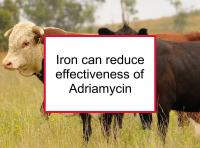The relationship between iron and breast cancer is not well understood. Iron is an essential nutrient and its concentration in cells is regulated very closely. However, iron facilitates cell proliferation and growth and can have a role in free radical formation. As such, iron appears capable of contributing to tumor development and growth.
On the other hand, there is evidence that iron deficiency anemia can promote breast cancer in young women. It is also possible that iron has a more important role in the metastasis of breast cancer than in its initial development. Previous studies have reported that high levels of iron or ferritin (a molecule that stores iron) can interfere with the treatment of breast cancer with the chemotherapy drugs cisplatin and doxorubicin. Now a new study has demonstrated how ferritin interferes with the treatment effects of doxorubicin.
Ferritin and iron
Ferritin is a protein whose main function is to store iron in cells and release it in a controlled manner as needed. Ferritin is also found in circulation; the ferritin blood test indirectly measures the level of iron stored in the body. Ferritin is also involved in cell proliferation and angiogenesis, as well as in suppressing the immune system. Ferritin levels tend to be higher in women with breast cancer than in the general population and increases in ferritin levels have been linked to poor outcomes.
Breast cancer cells have abnormal pathways of iron acquisition, storage and regulation, suggesting that reprogramming of iron metabolism is an important aspect of cancer cell survival. One study reported that breast cancer cells increase the expression of iron importer and decrease the expression of iron exporter genes to accommodate the cells' increased need for iron. Another study reported that ferritin may also promote the proliferation of breast cancer cells independently of its iron content. Preliminary efforts are underway to investigate possible breast cancer treatments based on iron metabolism.
Iron contributes to doxorubicin-induced cardiomyopathy
Doxorubicin is known for producing cardiomyopathy, damage to the heart muscle that weakens its ability to pump and can lead to heart failure in some cases. The cardiotoxic effects of doxorubicin develop in the presence of mitochondrial iron accumulation—reducing mitochondrial iron levels has been shown to protect against doxorubicin-induced cardiomyopathy.
Iron intake during doxorubicin chemotherapy
Many women undergoing chemotherapy develop anemia, which can result in severe complications. Since blood counts usually are monitored during chemotherapy, these women will be identified and treated. However, based on the available evidence, women on doxorubicin or cisplatin who are not anemic should avoid iron supplements (including those in multivitamins), as well as sources of heme iron (i.e., from animals or seafood) such as red meat, shellfish or any type of liver. The body absorbs heme iron more effectively than nonheme iron from plant sources such as spinach and dry beans. Tumeric contains curcumin, which has been shown to be an iron chelator, which may be helpful in reducing iron stores. Drinking chamomile tea can also interfere with the absorption of dietary iron.
Latest research shows how ferritin protects breast cancer cells
The study referenced at the beginning of this news story was designed to investigate how ferritin can protect hormone receptor positive (ER+/PR+) MCF-7 breast cancer cells against treatment with doxorubicin. The effects of ferritin (i.e., human liver ferritin) and doxorubicin on the cells were evaluated using three separate techniques.
Treatment with ferritin was found to activate MCF-7 breast cancer cell proliferation. The increased proliferation occurred in a dose- and time-dependent manner. Treatment with doxorubicin alone greatly increased intracellular reactive oxygen species (ROS) production (which causes significant damage to cell structures, leading to cell death). However, adding ferritin reduced this additional ROS formation, thereby reducing doxorubicin‑induced cell death. Conversely, the inhibition of ferritin sensitized cells to doxorubicin. Treatment with doxorubicin alone significantly induced cyclin-dependent kinase inhibitor p21, which can trigger cell growth arrest and cellular senescence. However, ferritin reduced p21 expression. The authors conclude that ferritin plays an important role in protecting breast cancer cells against doxorubicin. Judiciously reducing ferritin levels may be a useful strategy for overcoming chemoresistance in breast cancer, according to the authors.
Please see our article on breast cancer diet during doxorubicin chemotherapy for more information.
